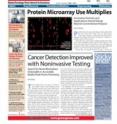GEN reports on novel noninvasive tests for early cancer detection
Researchers at last month's AACR conference in Orlando demonstrated that they are intensifying their efforts to identify and validate various types of biomarkers that are detectable in readily accessible bodily fluids such as blood and urine, reports Genetic Engineering & Biotechnology News (GEN). The goal is to detect biosignatures that are more specific and sensitive than existing diagnostic modalities, according to the May 1 issue of GEN (http://www.genengnews.com/gen-articles/cancer-detection-improved-with-noninvasive-testing/3639/). "The molecular diagnostic approach is geared toward finding tumors earlier in the course of disease," says John Sterling, Editor in Chief of GEN. "This could reduce the need for more invasive and costly biopsies and imaging studies and lead to earlier therapeutic intervention."
At the AACR meeting, Harvey Pass, M.D., New York University Langone Medical Center and Cancer Center, discussed his group's experience working in collaboration with SomaLogic to develop an aptamer-based diagnostic to detect malignant mesothelioma in asbestos-exposed individuals. Dr. Pass presented data derived from the application of biomarker subsets to a blinded test set, demonstrating 100% specificity and 80% sensitivity for their ability to distinguish asbestos-exposed controls from mesothelioma cases.
Another presentation pointed out that measurement of CA125 in the blood is the test currently used to monitor ovarian cancer treatment, follow patients for recurrence, and in some cases screen high-risk individuals to detect early-stage disease. In her conference talk, Christine Coticchia, Ph.D., Children's Hospital Boston and Harvard Medical School, emphasized that CA125 is relatively nonspecific for ovarian cancer and uninformative in a substantial percentage of patients. Dr. Coticchia and colleagues are studying a combination of two matrix metalloproteases, MMP-2 and MMP-9, in urine for their utility as biomarkers to predict the presence of ovarian cancer in women with normal CA125 levels.
Source: Mary Ann Liebert, Inc./Genetic Engineering News
Other sources
- Novel noninvasive tests for early cancer detectionfrom Science DailyTue, 3 May 2011, 21:30:26 UTC
- GEN reports on novel noninvasive tests for early cancer detectionfrom Science BlogTue, 3 May 2011, 20:30:35 UTC
